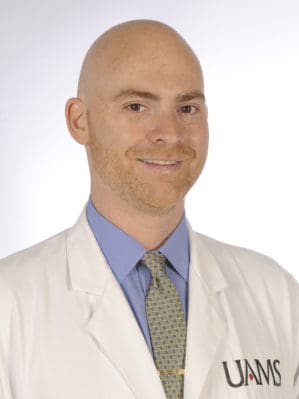
Graham Strub, M.D., Ph.D., an associate professor in the University of Arkansas for Medical Sciences (UAMS) Department of Otolaryngology—Head and Neck Surgery, will lead a five-year study to lay the foundation for a new treatment that could transform the quality of life for children with lymphatic malformations.
A pediatric otolaryngologist who sees patients at Arkansas Children’s Hospital, Strub will use a recent $3.2 million award from the National Institutes of Health to lead investigators at Arkansas Children’s Research Institute (ACRI) and UAMS.
In collaboration with Robert J. Griffin, Ph.D., a professor of radiation and cancer biology in the UAMS Department of Radiation Oncology, the study will examine how microRNAs, which are small molecules that silence the expression of specific genes, can reverse the growth and development of the malformations, which are a type of vascular anomaly of the lymphatic system and often cause breathing and feeding difficulties for children. Patients also frequently experience pain, infections and disfigurement.
Strub’s laboratory has been collecting tissue and blood from patients, with the goal of developing new treatments. Using the novel approach of comparative multi-omics, researchers in the lab discovered the abnormal expression of several genes that appear to drive the growth of lymphatic malformations. Multi-omics is a holistic approach that combines data from genomics, transcriptomics, epigenetics and proteomics to understand molecular changes that contribute to normal development, cellular response and disease.
The teams are hopeful this novel technology will improve treatment outcomes, reduce side effects and increase understanding of the epigenetic regulation of the lymphatic system.
“Current treatments for lymphatic malformations have many limitations and often require multiple interventions over a long period of time,” Strub said. “The development of transdermal microRNA therapeutics that silence the genes responsible for lymphatic malformation growth could significantly improve the quality of life of these children.”
The research is supported by the National Heart, Lung and Blood Institute of the National Institutes of Health under Award Number R01HL173107.
